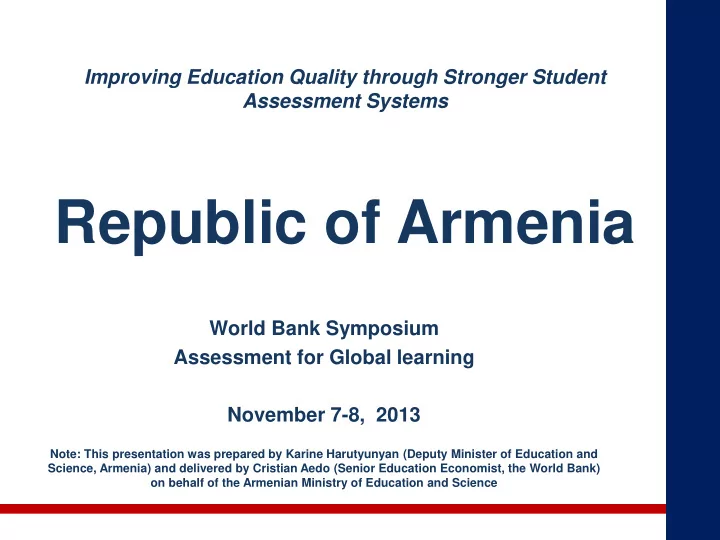

Improving Education Quality through Stronger Student Assessment Systems Republic of Armenia World Bank Symposium Assessment for Global learning November 7-8, 2013 Note: This presentation was prepared by Karine Harutyunyan (Deputy Minister of Education and Science, Armenia) and delivered by Cristian Aedo (Senior Education Economist, the World Bank) on behalf of the Armenian Ministry of Education and Science
Issues of the Assessment System in Armenia before 2004 • Lack of a system for measurement of education quality through a comprehensive and wide ranging assessment system. • Broken links between the learning objectives in the curriculum and the assessment system. • No evidence to compare across schools or across years or between subjects. • Lack of an evaluation system capable of monitoring how the intended curriculum was implemented. • Students were “tested” and “scored”, but not systematically “assessed” in terms of their progress.
Issues of the Assessment System in Armenia before 2004 (cont.) • Lack of necessary institutional structures to fulfill that task. • Lack of expertise to improve the quality of assessment practices, including shortage of trained assessment specialists. • Public examinations considered unreliable and not valid. • University entrance exams were administered by individual universities and perceived by the public as being not transparent and corrupt.
Advances in Assessment in Armenia since 2004 • Established a legal framework for a new assessment and examination system. • Set up assessment goals based on the National Curriculum Framework. • Improved techniques and instruments for continuous, formative and summative assessment using best international experience. • The Assessment and Testing Center was created in 2005 for developing and introducing new assessment tools and procedures as well as for conducting graduation and university entrance examinations.
Advances in Assessment in Armenia since 2004 (cont.) • The capacity of measurement and assessment has improved. • State graduation exams at the end of each level (4 th , 9 th , and 12 th ) introduced and conducted annually. • The country has been participating in TIMSS since 2003. • Awareness and public consensus on the necessity and importance of a new assessment system has been created.
Level of Development of Armenia’s Assessment System (SABER 2011)
Classroom Assessment Achievements: Challenges: • New approaches on Students ’ • Not enough time to educate Continuous Classroom teachers and teach practices on Assessment were elaborated and how to use assessment results to foster students’ learning put into use in schools in 2008 • • Classroom assessment More in-service teacher training specifications for all subjects were needed to make changes to developed and provided to teachers' assessment practices schools • Need for better pre-service • Teacher training on formative and teacher programs with emphasis summative assessment was on measurement and assessment delivered countrywide
Grade 12 Examination plays a dominant role in secondary education system (high stakes) Achievements: Challenges: • • Unified exam for school Increase public confidence and graduation and university entrance reduce malpractice during the examination process • One day one subject for all • students Exclusive use of multiple-choice questions which has a negative • The same test (clones) for all effect on teaching and learning in students key subjects • Exam centers near to the living • Weak quality control: no piloting of place of students test items • Transparent administration • Many students receive tutoring procedures for parents and the after school public • Comparability and stability of • Computer based scoring, high exam results between subjects objectivity and across years is an issue • Personal scores known by students on exam day
National Large-Scale Assessment Achievements: Challenges: • • The first NLSA was conducted in Need for further capacity Armenia in 2010 which provided development in various aspects of nationally comparable data: NLSA, including: HAAS test item & questionnaire design 2010 - Armenian language, literature & history sampling BAAS 2011 - Physics and data analysis Chemistry test logistic report writing using assessment results to enhance educational policy making
International Large-Scale Assessment Achievements: Challenges: • • Armenia has taken part in TIMSS Learning achievements have international assessment four fallen in international comparison times - TIMSS 2003, TIMSS 2007, between 2003 and 2011 TIMSS Advanced 2008, and TIMSS 2011 • TIMSS results are still not fully used for policy making
Armenia has a collaborative work with the Bank Component 1 : Having effective human resources: Intensive training program on classroom assessment for pre-service and in-service training Component and on large-scale assessment for ATC 1 Component 2: Supporting NLSA in key skills: ICT Literacy Test and piloting NLSA in key subjects Component 2 Bank support Component 3: Continuous support for Armenia’s participation in international assessments Component 3 Component 4: Feasibility studies for introducing computer-based reforms Component to the Unified Examination system 4
Policy Challenges • Convince that assessment is an integral part of the learning process and, ultimately, should aim to improve the quality of student learning. • Improve the quality of the examination to ensure that it correctly measures student’s knowledge or skills; improve examination administration. • Reduce test anxiety for students and reduce incentives for cheating and malpractice. • Reduce the consequences of the examinations in case of student's failure. • Design student preparation programs to be available through schools to ensure equal opportunities for all students and to make exams fair to students who cannot afford private tutoring services.
Armenia’s agenda in the assessment area • When creating its assessment plans, Armenia: – prioritizes the most important areas and skills it wants its students to learn and achieve. – aims at having a right balance and timing of different types of assessments for better achieving the country’s goals. – attempts to effectively use assessment results for informed decision making and policy formulation.
Our goal is achieving progress in all areas of Assessment System in Armenia
Recommend
More recommend